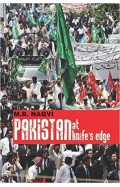Islamic Political Radicalism
By: Tahir Abbas
-
Rs 480.00
- Rs 600.00
- 20%
You save Rs 120.00.
Due to constant currency fluctuation, prices are subject to change with or without notice.
We are offering a high discount due to slightly damage.
Islamic political radicalism in Europe has seen dramatic growth in recent times. This book offers a sociological, anthropological, psychological and political science analysis of the causes and consequences of this phenomenon. Authors explore the motivations behind such radicalism, focusing on an array of different factors. These include economic and social alienation, political and cultural marginalisation, gender and masculinity, and psychological issues, both at an individual and community level. Other issues discussed are the state responses, national and international, to the 'War on Terror' which came about after the attacks on America in September 2001; and the role of Islamic political organisations and their impact on changing ethno-religious identities. This is considered particularly in relation to concept of the Ummah and its influence on the position of Islam and Muslims in places such as Iraq, Afghanistan, and Palestine, as well as Bosnia, Chechnya, and Kashmir. The authors provide an analysis of events and experiences in different European nation states, with a detailed focus on Britain. This book is particularly relevant in the current climate as an attempt to understand the factors that shape Islamic political radicalism in Europe. Key Features: *Written for academics as well as activists and practitioners *Explores major new and emerging issues, particularly in the aftermath of the July 2005 London bombings
We are offering a high discount due to slightly damage.
Islamic political radicalism in Europe has seen dramatic growth in recent times. This book offers a sociological, anthropological, psychological and political science analysis of the causes and consequences of this phenomenon. Authors explore the motivations behind such radicalism, focusing on an array of different factors. These include economic and social alienation, political and cultural marginalisation, gender and masculinity, and psychological issues, both at an individual and community level. Other issues discussed are the state responses, national and international, to the 'War on Terror' which came about after the attacks on America in September 2001; and the role of Islamic political organisations and their impact on changing ethno-religious identities. This is considered particularly in relation to concept of the Ummah and its influence on the position of Islam and Muslims in places such as Iraq, Afghanistan, and Palestine, as well as Bosnia, Chechnya, and Kashmir. The authors provide an analysis of events and experiences in different European nation states, with a detailed focus on Britain. This book is particularly relevant in the current climate as an attempt to understand the factors that shape Islamic political radicalism in Europe. Key Features: *Written for academics as well as activists and practitioners *Explores major new and emerging issues, particularly in the aftermath of the July 2005 London bombings
Zubin Mehta: A Musical Journey (An Authorized Biography)
By: VOID - Bakhtiar K. Dadabhoy
Rs 840.00 Rs 1,050.00 Ex Tax :Rs 840.00
A Century's Journey: How The Great Powers Shape The World
By: Robert A. Pastor, (editor)
Rs 800.00 Ex Tax :Rs 800.00
Irresistible Empire: America's Advance Through Twentieth-Century Europe
By: Victoria de Grazia
Rs 800.00 Rs 2,000.00 Ex Tax :Rs 800.00
Myths Illusions and Peace: Finding a New Direction for America in the Middle East
By: Dennis Ross
Rs 1,095.00 Ex Tax :Rs 1,095.00
Operation Dark Heart: Spycraft And Special Ops On The Frontlines Of Afghanistan And The Path To Victory
By: Anthony Shaffer
Rs 1,800.00 Rs 2,250.00 Ex Tax :Rs 1,800.00
Anna Hazare: The Face Of Indias Fight Against Corruption
By: Pradeep Thakur
Rs 300.00 Ex Tax :Rs 300.00
How To Win A Cosmic War God Globalization And The End Of War
By: Reza Aslan
Rs 695.00 Ex Tax :Rs 695.00
Witness To America: A Documentary History Of The United States From The Revolution To Today
By: Douglas Brinkley
Rs 4,495.50 Rs 4,995.00 Ex Tax :Rs 4,495.50
A Century's Journey: How The Great Powers Shape The World
By: Robert A. Pastor, (editor)
Rs 800.00 Ex Tax :Rs 800.00
Irresistible Empire: America's Advance Through Twentieth-Century Europe
By: Victoria de Grazia
Rs 800.00 Rs 2,000.00 Ex Tax :Rs 800.00
No recently viewed books available at the moment.
Zubin Mehta: A Musical Journey (An Authorized Biography)
By: VOID - Bakhtiar K. Dadabhoy
Rs 840.00 Rs 1,050.00 Ex Tax :Rs 840.00
A Century's Journey: How The Great Powers Shape The World
By: Robert A. Pastor, (editor)
Rs 800.00 Ex Tax :Rs 800.00
Irresistible Empire: America's Advance Through Twentieth-Century Europe
By: Victoria de Grazia
Rs 800.00 Rs 2,000.00 Ex Tax :Rs 800.00














-120x187.jpg?q6)

















